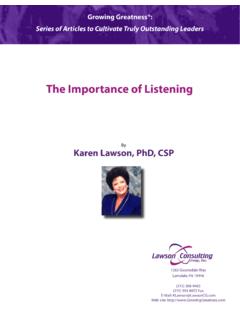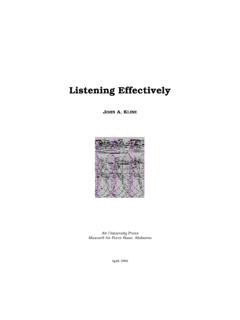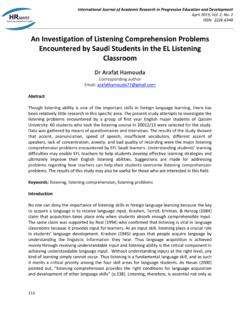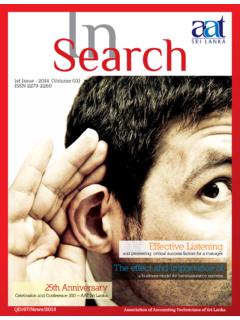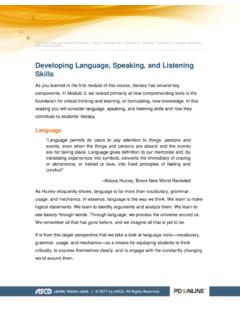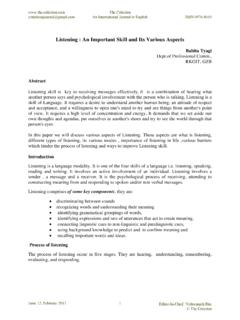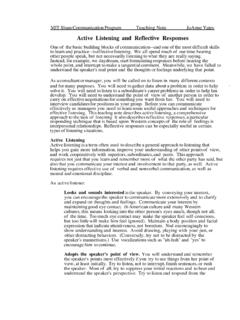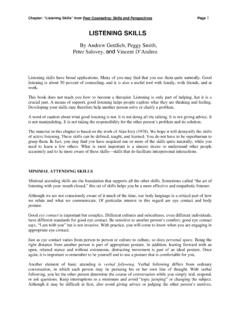Transcription of THE ROLE OF COMMUNICATION AND LISTENING IN …
1 THE ROLE OF COMMUNICATION AND LISTENING IN leadership _____ A Thesis Presented to the Faculty in COMMUNICATION and leadership Studies School of Professional Studies Gonzaga University _____ Under the Supervision of Dr. John Caputo Under the Mentorship of Dr. David Givens _____ In Partial Fulfillment Of the Requirements for the Degree Master of Arts in COMMUNICATION and leadership Studies _____ By (Elinor) Kae Van Engen May 2012 Abstract In our world today, leadership is important in many organizations. Leaders create the opportunity to develop relationships based on LISTENING . LISTENING is a multidimensional construct that requires further integration within leadership studies. This study aimed to seek the validity of focusing on LISTENING within the study of leadership . The research promotes the understanding of the verbal and nonverbal characteristics of the LISTENING process that have the greatest ability to influence a person s leadership potential, as well as examining what leadership characteristics can influence a person s LISTENING .
2 Understanding these characteristics presents evidence that LISTENING deserves the recognition to be studied as an important COMMUNICATION skill. Specifically, the focus was to send a survey to an equal number of educational institutions and businesses to create a balance of education and implementation within a workforce. The survey was sent to these organizations and then a snowball sampling occurred. Total completed surveys included a response rate of percent, and respondents indicated behavioral characteristics, as well as nonverbal responses to be important in a LISTENING setting. Responses were compared to Kouzes and Posner s Ten Commitments of leadership and Greenleaf s model of Servant- leadership . Further results of this study, indicated that leadership settings incorporate certain verbal and nonverbal behaviors. This study supported that leadership is about behavior, rather than personality or character. Also provided are suggestions for further studies regarding these topics.
3 Table of Contents Abstract Chapter 1: Introduction 1 Purpose of the Study 1 importance of Study 2 Statement of the Problem 2 Definition of Terms 3 Organization of Remaining Chapters 4 Chapter 2: Literature Review 5 Philosophical Assumptions and Theoretical Basis 6 The Literature 7 Rationale for Study 19 Research Questions 19 Chapter 3: Scope and Methodology 21 The Scope of the Study 21 The Methodology of the Study 22 Chapter 4: The Study 25 Introduction 25 Data Analysis 25 Results of the Study 27 Discussion 30 Chapter 5: Summary and Conclusions 35 Summary of the Study 35 Limitations of the Study 35 Recommendations for Further Study 37 Conclusion 38 References 39 Appendix: Survey 44 Informed Consent 44 Survey Instrument 45 1 Chapter 1: Introduction Everyone participates in COMMUNICATION on a daily basis.
4 COMMUNICATION is about people speaking and LISTENING . LISTENING to others, as well as understanding others is essential. It is often said that LISTENING is the first language skill one develops, and as a result all cognitive skills are dependent on the ability to listen. The Greek philosopher Epictetus may have been the first person to notice that humans were created with two ears, but only one tongue, so that humans may listen twice as much as they speak (King, 2008, p. 2718). Today, we hear and use many proverbs about this wisdom. leadership is also about people; people communicating, developing relationships and people working to improve society. leadership depends on interactions and the use of COMMUNICATION . Since meaning is generated through COMMUNICATION , developing relationships with others and leading others requires knowledge of LISTENING . The Problem/Goal The concept of LISTENING in leadership is not without many challenges.
5 LISTENING is an important behavior; however, it should also be considered a leadership quality. Both servant- leadership and transformational leadership seek to earn respect and trust by developing relationships, and relationships develop though shared dialogue. The International LISTENING Association advocates for LISTENING , yet theoretical research in the LISTENING field is lacking currency (Janusik, 2010, p. 203). Research has focused on developing LISTENING as a skill required for effective leadership . De Pree (2004) states a leader s most trusted and familiar tools are COMMUNICATION skills (p. 104). Hackman and Johnson (1994) indicate leadership competence is the product of COMMUNICATION competence (p. 50). As a leader, LISTENING for understanding is 2 important, as well as LISTENING for needs and desires of those served (Steil & Bommelje, 2004; Wolvin 2010a).The intent of this study is to look at LISTENING and connect the overall success of a leader to the component of LISTENING .
6 In so doing, the various components of the LISTENING process will be understood. importance of the Study This study explores the concept of LISTENING and its relationship to effective leadership . LISTENING is often equated with hearing; however, this is not the case. Having the ability to hear does not guarantee a person s ability to listen, since hearing happens automatically (Barker & Watson, 2000, p. 7; Imhof, 2010, p. 100). Hearing involves the reception of sounds and occurs automatically without a conscious effort. LISTENING requires the combination of verbal and nonverbal responses, along with a person s cognition and behavioral traits. Interpersonal relationships are built and developed through LISTENING , by giving other people the attention and respect they deserve. leadership incorporates LISTENING , yet LISTENING is a skill that is not taught in leadership studies nor is a subject in leadership books. It appears to be assumed, rather than studied.
7 Through this research, characteristics of LISTENING should be recognized and correlated with behaviors leaders seek to imitate. Statement of the Problem This thesis is seeking to uncover what verbal and nonverbal aspects of LISTENING have the greatest impact on the LISTENING process and what specific aspect of leadership has the greatest potential to influence a person s LISTENING . 3 Definition of Terms Used For the purpose of this study, the following definitions are used: Behavioral one s visible response to the internal processing of what was just said or observed Cognitive the thought process behind one s perception, memory and reasoning of what was just heard or said. These cognitive characteristics within a leader are the beginning of the servant- leadership model (Russell & Stone, 2002). Empathy--feeling and thinking with another person, entering the other person s frame of reference (Brownell, 2010a, p. 173; Stewart, 2009, p.)
8 555) or walking in someone else s shoes (Worthington & Fitch-Hauser, 2012, p. 31). Foresight strategies for making decisions and leading (Sipe & Frick, 2009, p. 106), combining head, heart and gut (p. 111) within servant- leadership Leader a person who guides an organization by inspiration and tends to focus more on the vision of the organization leadership -- a unique form of human COMMUNICATION which develops into a relationship to enhance organizational effectiveness and modifies the attitudes and behaviors of others to meet shared goals and needs (Hackman & Johnson, 2009, p. 11). LISTENING the process of receiving, constructing meaning from and responding to spoken or nonverbal messages (International LISTENING Association, 1995, pp. 4-5). 4 Servant- leadership a transformational approach to life and work, that has the potential for creating positive change throughout society, whereby others grow as people because their needs are being served (Spears, 2002, p.
9 4). Transformational leadership a relationship of mutual stimulation and elevation that converts followers into leaders and may convert leaders into moral agents (Burns, as cited in Hackman & Johnson, 2009, p. 103). Organization of Remaining Chapters This chapter has introduced the idea of LISTENING within the leadership field, noting there are differences between hearing and actual LISTENING . Chapter two will review the philosophical and theoretical basis of studying LISTENING and leadership and provides an exemplary review of the literature in this field. The research methodology and scope are presented in chapter three. Chapter four provides the results of the study, as well as an analysis of the data. Finally, chapter five reports on the relevance of the current findings, describes the limitations of the study and suggests opportunities for further research. 5 Chapter 2: Review of Literature LISTENING is a vital component to creating and maintaining relationships.
10 LISTENING is the first skill developed, and from LISTENING , language can be acquired and mastered (Lundsteen, 1979; Wilt, 1950; Wolvin & Coakley, 1996). By LISTENING , relationships can be enhanced through dialogue, as indicated by the phenomenological tradition of COMMUNICATION . This review will provide an overview of the concept of LISTENING , particularly in the cognitive and behavioral dimension. A review of literature regarding LISTENING within a leadership setting will follow, along with discussion on how these two concepts are related. While most COMMUNICATION theories are relevant to LISTENING , the congruence theory, Buber s dialogue theory and the social penetration theory best represent the LISTENING and leadership aspects. In addition, Ernest Bormann s theory of symbolic convergence will be discussed in relationship to community and small groups. Leaders cannot lead without recognizing the importance of communicating and LISTENING .





